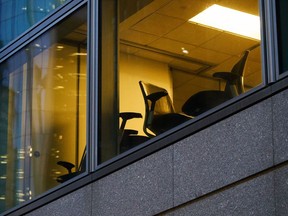According to CBRE Group Inc., workers are projected to spend 20% to 25% less time in offices compared to before the pandemic. This trend reflects the ongoing shift toward remote work as companies adapt to the post-pandemic landscape.
Workers to Spend At Least 20% Less Time in Offices Post-Pandemic
Back to video: The article mentions that workers are expected to spend at least 20% less time in offices than before the pandemic. This projection highlights the significant impact of remote work on office environments, as companies continue to balance in-person and virtual workforces.
Principal Insights from CBRE Group
CBRE Group’s analysis emphasizes the challenges companies face in balancing in-person work with remote work policies. Chief Executive Bob Sulentic stated that the pandemic has accelerated the decline in office demand due to widespread adoption of remote work. He mentioned, "We’re still trying to figure out what the optimal place is," during a panel hosted by the Dallas Regional Chamber.
Remote Work’s Impact on Real Estate
The shift toward remote work has had far-reaching implications for the real estate industry. Landlords have reported declining tenant demand as more companies opt for flexible work arrangements. This trend has contributed to increased office vacancies, with CBRE noting that the U.S. office vacancy rate reached 12.3% in the fourth quarter of 2022.
Key Statistics and Trends
- Office Vacancy Rate: The U.S. office vacancy rate is at its highest level since 2020.
- Remote Work Adoption: More than 50% of U.S. workers now prefer remote work as their primary or secondary work location, according to recent surveys.
- Flexibility in Workforce Management: Companies are increasingly relying on hybrid models, with 70% of employees working remotely at least two days a week.
Challenges for Landlords
The pandemic has also strained office spaces, with CBRE Group reporting that lease cancellations and defaults have risen significantly. Landlords are struggling to find tenants due to the decline in demand for office space. This situation is expected to persist as companies continue to adapt to remote work trends.
Conclusion
The shift toward remote work presents both opportunities and challenges for businesses and real estate markets. CBRE Group’s analysis underscores the need for flexibility in workforce management and highlights the importance of adapting to changing consumer preferences. As companies navigate this evolving landscape, they must rethink their office spaces and accommodate diverse workstyles effectively.
End of Article



